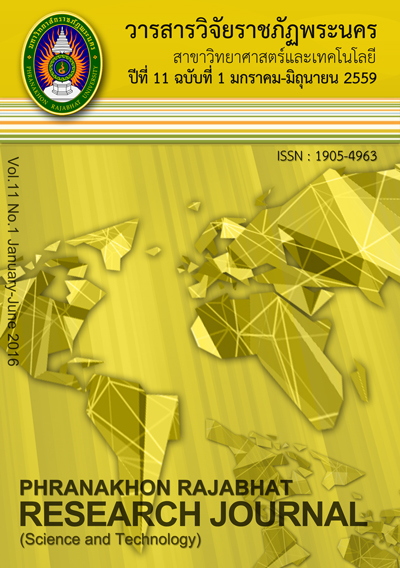ประสิทธิภาพของสารสกัดสมุนไพรไทยต่อเชื้อก่อโรคในระบบทางเดินอาหารของสุกรเล็ก
Keywords:
สารสกัดสมุนไพร, สุกร, Escherichia coli, Salmonella cholerassuisAbstract
สมุนไพรเป็นพืชที่ได้จากธรรมชาติมีสรรพคุณที่หลากหลายหาได้ง่ายในท้องถิ่นบางชนิดสามารถนำมาใช้ในการรักษาโรคบางตัวได้ โดยการนำสมุนไพรมาใช้โดยตรงหรืออาจได้จากกระบวนการสกัดด้วยวิธีทางเคมี พืชสมุนไพรส่วนมากไม่มีสารพิษตกค้างเมื่อเปรียบเทียบกับการใช้ยาปฏิชีวนะในการรักษาโรค จากการทดสอบประสิทธิภาพของสารสกัดสมุนไพรไทย 100 ชนิด ที่สามารถยับยั้งเชื้อ Escherichia coli และ Salmonella cholerassuis ซึ่งเป็นแบคทีเรียที่ก่อให้เกิดโรคในระบบทางเดินอาหารของสุกรเล็ก จากการทดลองพบว่าสารสกัดสมุนไพรที่สามารถยับยั้งเชื้อ E. coli โดยเรียงลำดับจากค่าเฉลี่ยที่มีค่ามากไปหาน้อยในวิธีสกัด Tr1 คือ แก่นคูน, ขิง และใบผกากรอง ซึ่งมีค่าเฉลี่ยของวงปฏิกิริยาเท่ากับ 15.66±2.08, 13.00±1.73 และ 12.33±2.51 มิลลิเมตร ตามลำดับ ซึ่งแตกต่างอย่างมีนัยสำคัญทางสถิติที่ระดับความเชื่อมั่น 99 เปอร์เซ็นต์ และวิธีสกัด Tr2 คือ แก่นคูน, ใบขนุน และใบโหระพา ซึ่งมีค่าเฉลี่ยของวงปฏิกิริยาเท่ากับ 12.66±2.57, 12.00±1.73 และ 11.33±3.21 มิลลิเมตร ตามลำดับ ซึ่งแตกต่างอย่างมีนัยสำคัญ ทางสถิติที่ระดับความเชื่อมั่น 99 เปอร์เซ็นต์ และผลการทดสอบสมุนไพร ที่สามารถยับยั้งการเจริญของเชื้อ S. cholerassuis ในวิธีสกัด Tr1 คือ กาบมะพร้าว, ใบกระท้อน และใบเล็บมือนาง ซึ่งมีค่าเฉลี่ยของวงปฏิกิริยาเท่ากับ 20.33±7.50, 20.00±1.00 และ 18.33±1.52 มิลลิเมตร ตามลำดับ ซึ่งแตกต่างอย่างมีนัยสำคัญทางสถิติที่ระดับความเชื่อมั่น 99 เปอร์เซ็นต์ และวิธีสกัด Tr2 คือ มะขามป้อม, ผลมะขาม และไมยราบ ซึ่งมีค่าเฉลี่ยของวงปฏิกิริยาเท่ากับ 18.66±5.68, 17.00±1.73 และ15.33±2.88 มิลลิเมตร ตามลำดับ ซึ่งแตกต่างอย่างมีนัยสำคัญทางสถิติที่ระดับความเชื่อมั่น 99 เปอร์เซ็นต์ และจากการทดสอบฤทธิ์ของสารสกัดพืชสมุนไพรทั้ง100 ชนิดเมื่อเปรียบเทียบค่าเฉลี่ยที่ได้จากวิธีสกัดทั้ง 2 วิธี (Tr1 และ Tr2) พบว่าสารสกัดสมุนไพรที่สกัดด้วยวิธี Tr1 สามารถยับยั้งการเจริญของเชื้อ E. coli และ S. cholerassuis ได้ดีกว่าสารสกัดสมุนไพรที่สกัดด้วยวิธี Tr2 ซึ่งจากการศึกษาในครั้งนี้สามารถที่จะนำผลการศึกษาไปใช้ในการเลี้ยงสุกรได้โดยอาจนำพืชสมุนไพรไปใช้กับสุกรได้โดยตรง หรืออาจทำการสกัดสมุนไพรที่สกัดด้วยวิธี Tr1 และนำมาผสมในอาหารสุกรหรือให้สุกรกิน
Herb are plants from nature. It has properties that range, easily find locally. Some herbs can be used to treat disease. Herb used directly or can be extracted by chemical processes. Most plants not residue when compared to the use of antibiotics to treat the disease. Performance testing of herbal extracts of Thailand 100 species which can inhibit Escherichia coli and Salmonella choleraesuis the bacteria that cause diseases in the digestive tract of young pigs. The results showed that the herbal extract can inhibit the E. coli by sorting out a lot at least in the way Tr1 core is Golden shower, Ginger and Cloth of gold flower with an average of reaction were 15.66 ± 2.08, 13.00 ± 1.73 and 12.33. ± 2.51 mm, respectively. Extraction method the core Tr2 include Golden shower, False trevally leave and Basil leave. Which is the average of the reaction were 12.66 ± 2.57, 12.00 ± 1.73 and 11.33 ± 3.21 mm, respectively. Herbs and test results, which can inhibit the growth of bacteria S. choleraesuis in Tr1 is extraction method, Coir, Mitragyna speciosa leave and Rangoon creeper leave. Which is the average of the reaction were 20.33 ± 7.50, 20.00 ± 1.00 and 18.33 ± 1.52 mm, respectively. The extract is Tr2 Puree, Tamarind fruit and Mimosa leave, whose average of the reaction was 18.66 ± 5.68, 17.00 ± 1.73 and 15.33 ±2.88 mm, respectively, which differ significantly statistical confidence level of 99 percent and testing the effect of extracts of medicinal plants, 100 species when compared the average from the 2 extraction method method (Tr1 and Tr2) found that the herbal extract with Tr1 can inhibit the growth of E. coli and S. choleraesuis better than herbal extracts extracted by Tr2. This difference was statistically significant at the 99 percent confidence level. The results of this study can be used to feed the pigs. By bringing plants to the pigs directly or herbal extracts with Tr1 and mixed in feed for pigs or eat.
Downloads
Published
Issue
Section
License
โปรดกรอกเอกสารและลงนาม "หนังสือรับรองให้ตีพิมพ์บทความในวารสารวิจัยมหาวิทยาลัยราชภัฏพระนคร สาขาวิทยาศาสตร์และเทคโนโลยี" ก่อนการตีพิมพ์




